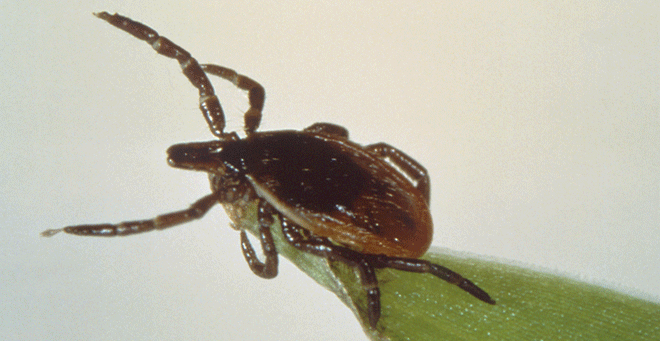 |
|
|
Scientists at UMass Medical School’s MassBiologics are developing a pre-exposure prophylaxis that prevents tick-transmitted infection of Lyme disease, a breakthrough that could lead to seasonal prevention against the most common tick-borne infection in North America. (Image courtesy of the CDC) |
Scientists at UMass Medical School’s MassBiologics are developing a pre-exposure prophylaxis that prevents tick-transmitted infection of Lyme disease, a breakthrough that could lead to seasonal prevention against the most common tick-borne infection in North America. The research will be presented on Friday, Oct. 9, in San Diego at IDWeek 2015TM, the annual meeting of the Infectious Disease Society of America, the Society for Healthcare Epidemiology of America, the HIV Medicine Association and the Pediatric Infectious Diseases Society. The research report details the effectiveness of a monoclonal antibody in targeting the bacteria that causes Lyme disease in mice, the most common natural reservoir for the bacteria.
“In our strategy, individuals would receive an injection in the spring of a single human monoclonal antibody targeting a protein on the surface of the bacteria that would provide immediate protection against Lyme disease and that protection would last for about 6 months, which is the risk period when the ticks that transmit Lyme disease are active,” said Mark S. Klempner, MD, executive vice chancellor of MassBiologics and professor of medicine at UMMS. “This is the same strategy—a monoclonal antibody that targets an infectious disease—that is used to prevent one of the most severe forms of pneumonia in premature infants called respiratory syncytial virus (RSV). With over 15 years of data showing the safety and effectiveness of administering this human monoclonal antibody (Synagis ®) to these most vulnerable babies, we have observed a very high level of protection with virtually no short or longer term serious adverse reactions.”
MassBiologics discovers, develops and manufactures biologic medicines that improve the lives of the people in the Commonwealth of Massachusetts. As the only non-profit, medical-school-affiliated, FDA-licensed manufacturer of vaccines and other biologic medicines like monoclonal antibodies, MassBiologics has a particular focus on public health priorities.
Lyme disease is the most common tick-borne infection in North American and Eurasian countries with temperate climates. It is spread through the bite of infected ticks. The only currently available means to prevent Lyme disease is to avoid exposure to infected ticks.
Worldwide, three main genospecies of the bacteria Borrelia are associated with Lyme disease in humans. B. burgdorferi is the main cause of Lyme disease in North America, while B. garinii and B. afzelii are the prevalent strains that cause the disease in Europe and Asia. To develop a human monoclonal antibody for pre-exposure prophylaxis of Lyme disease, Dr. Klempner, Yang Wang, MD, PhD, assistant professor of medicine, and colleagues created a panel of borreliacidal human monoclonal antibodies by immunizing mice that were transgenic for human immunoglobulin genes for a surface protein of B. burgdorferi. They tested more than 90 monoclonal antibodies and picked four for further investigation, based on how well they killed the bacteria. Two of the four were selected for further study in vivo—both prevented infection of mice when challenged with infected ticks.
These studies suggest that OspA-specific human monoclonal antibody could provide pre-exposure prophylaxis for Lyme disease worldwide caused by a broad range of Borrelia genospecies, since the antibody target appears ‘highly conserved’—common across most species of Borrelia.
Klempner said preclinical development is now under way to define the pharmacokinetics and refine the minimum dosage required to provide long-term protection from infection.